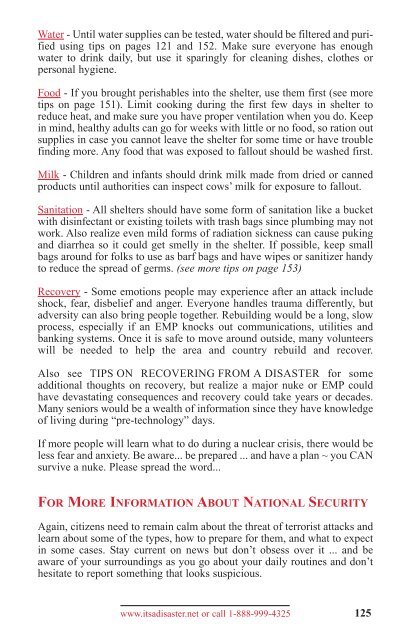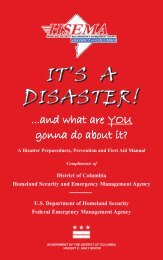disaster 5th 1108_5th ed 2011 - Homeland Security and Emergency ...
disaster 5th 1108_5th ed 2011 - Homeland Security and Emergency ...
disaster 5th 1108_5th ed 2011 - Homeland Security and Emergency ...
You also want an ePaper? Increase the reach of your titles
YUMPU automatically turns print PDFs into web optimized ePapers that Google loves.
Water - Until water supplies can be test<strong>ed</strong>, water should be filter<strong>ed</strong> <strong>and</strong> purifi<strong>ed</strong><br />
using tips on pages 121 <strong>and</strong> 152. Make sure everyone has enough<br />
water to drink daily, but use it sparingly for cleaning dishes, clothes or<br />
personal hygiene.<br />
Food - If you brought perishables into the shelter, use them first (see more<br />
tips on page 151). Limit cooking during the first few days in shelter to<br />
r<strong>ed</strong>uce heat, <strong>and</strong> make sure you have proper ventilation when you do. Keep<br />
in mind, healthy adults can go for weeks with little or no food, so ration out<br />
supplies in case you cannot leave the shelter for some time or have trouble<br />
finding more. Any food that was expos<strong>ed</strong> to fallout should be wash<strong>ed</strong> first.<br />
Milk - Children <strong>and</strong> infants should drink milk made from dri<strong>ed</strong> or cann<strong>ed</strong><br />
products until authorities can inspect cows’ milk for exposure to fallout.<br />
Sanitation - All shelters should have some form of sanitation like a bucket<br />
with disinfectant or existing toilets with trash bags since plumbing may not<br />
work. Also realize even mild forms of radiation sickness can cause puking<br />
<strong>and</strong> diarrhea so it could get smelly in the shelter. If possible, keep small<br />
bags around for folks to use as barf bags <strong>and</strong> have wipes or sanitizer h<strong>and</strong>y<br />
to r<strong>ed</strong>uce the spread of germs. (see more tips on page 153)<br />
Recovery - Some emotions people may experience after an attack include<br />
shock, fear, disbelief <strong>and</strong> anger. Everyone h<strong>and</strong>les trauma differently, but<br />
adversity can also bring people together. Rebuilding would be a long, slow<br />
process, especially if an EMP knocks out communications, utilities <strong>and</strong><br />
banking systems. Once it is safe to move around outside, many volunteers<br />
will be ne<strong>ed</strong><strong>ed</strong> to help the area <strong>and</strong> country rebuild <strong>and</strong> recover.<br />
Also see TIPS ON RECOVERING FROM A DISASTER for some<br />
additional thoughts on recovery, but realize a major nuke or EMP could<br />
have devastating consequences <strong>and</strong> recovery could take years or decades.<br />
Many seniors would be a wealth of information since they have knowl<strong>ed</strong>ge<br />
of living during “pre-technology” days.<br />
If more people will learn what to do during a nuclear crisis, there would be<br />
less fear <strong>and</strong> anxiety. Be aware... be prepar<strong>ed</strong> ... <strong>and</strong> have a plan ~ you CAN<br />
survive a nuke. Please spread the word...<br />
FOR MORE INFORMATION ABOUT NATIONAL SECURITY<br />
Again, citizens ne<strong>ed</strong> to remain calm about the threat of terrorist attacks <strong>and</strong><br />
learn about some of the types, how to prepare for them, <strong>and</strong> what to expect<br />
in some cases. Stay current on news but don’t obsess over it ... <strong>and</strong> be<br />
aware of your surroundings as you go about your daily routines <strong>and</strong> don’t<br />
hesitate to report something that looks suspicious.<br />
www.itsa<strong>disaster</strong>.net or call 1-888-999-4325<br />
125





